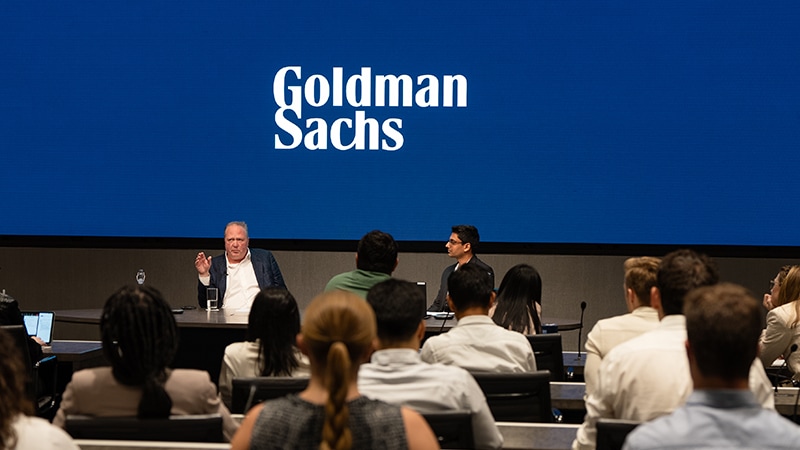July 9, 2024

For household products maker Procter & Gamble, the highest goal is to delight the consumer, according to Chairman, President, and CEO Jon Moeller. And that colors how he sees new artificial intelligence technologies. The point is not simply to find ways to use AI, but rather to find ways that AI can be used for that outcome — to create delight, Moeller said in a discussion with Goldman Sachs Asset Management.
“The outcomes are consumer, customer, employee, societal, and shareholder delight, period,” Moeller said on June 6 at The Forum with Ashish Goyal from the Fundamental Equities US Equity Team in GSAM. The Forum is a daily meeting that convenes leading experts to discuss global trends that impact GSAM’s investments. “If AI helps us drive those outcomes better and sooner, we should embrace it. If it doesn’t, it’s not as important to me.”
He cited the ability of technology, including new AI tools, to improve quality control processes. Existing methods for establishing that a product meets standards might involve testing it in a warehouse weeks after it’s manufactured. That has obvious drawbacks, since the company might have to scrap or rework an entire production run after a problem is uncovered. Better to incorporate sensors and algorithms that can identify quality problems as they occur.
“We want everything done in real time, on the line, with technology, so that we know instantly if something is wrong,” Moeller explained. “And with AI, we can start trending toward knowing instantly — knowing before it happens, not just when it happens.”
In Procter & Gamble’s business, delighting the consumer means coming up with products that are clearly superior in a specific category, he said. This might be a diaper that doesn’t leak as often, or a laundry detergent that works better in cold water so that less energy is used in washing.
Moeller said the company wants to sell products with “irresistible or noticeable superiority from first use,” and he talks about commitments to such products as “superiority investments.” Innovation in consumer products can be time consuming and very expensive, he said. Conceptualizing an innovative idea may be the easy part, but then the company has to figure out how to make the product on an industrial scale, building a production line that “operates faster than your eye can even follow.”
Then there is the expense of bringing a product to market and figuring out how to reach the consumer. Here again, Moeller said there may be a role for AI and a potential advantage. A large company like Procter & Gamble has deep experience with advertising and extensive data on what works.
“Which means we can much better train an AI model to help us, again on a preliminary basis, evaluate characteristics of advertising,” Moeller said. “Is this likely to break through? Is it likely to drive market growth?”
Moeller said there may also be potential for the use of AI in Procter & Gamble’s laboratories. “We’re increasingly moving innovation from the lab bench to very sophisticated computers,” he said. This may help the company to speed up molecular discovery, explore more areas for innovation, and come up with more successful product ideas.
Even as he described how AI may speed up processes that take a lot of employee hours today, Moeller suggested that AI is unlikely to lead to lower employment. “Probably the reverse is true,” he said. “If you have tools that make people more effective and more efficient, those people become more valuable.”
Goldman Sachs Research has predicted that generative AI adoption won’t lead to large job losses and may even boost employment as the technology creates new opportunities.
Moeller, who was Procter & Gamble’s CFO before he became CEO, compared what’s happening with the implementation of new AI tools to what happened in financial and accounting realms with the adoption of spreadsheets several decades ago. Employees in financial roles could suddenly do things they had never been able to do before, he said, “and we hired more of them.”
Moeller’s views on this topic can be seen in his efforts to promote “digital acumen” among Procter & Gamble’s employees. He identified that as one of his high-priority focus areas for the company. His point is that the continuous improvement of the digital skills of the people who work for and lead Procter & Gamble will be key to keeping up with new technologies, including generative AI.
“We’re not going to be able to take full advantage of the technology that’s available to us if people don’t know what’s possible and don’t know what questions they should be asking to their teams,” Moeller said.
This article is being provided for educational purposes only. The information contained in this article does not constitute a recommendation from any Goldman Sachs entity to the recipient, and Goldman Sachs is not providing any financial, economic, legal, investment, accounting, or tax advice through this article or to its recipient. Neither Goldman Sachs nor any of its affiliates makes any representation or warranty, express or implied, as to the accuracy or completeness of the statements or any information contained in this article and any liability therefore (including in respect of direct, indirect, or consequential loss or damage) is expressly disclaimed.
